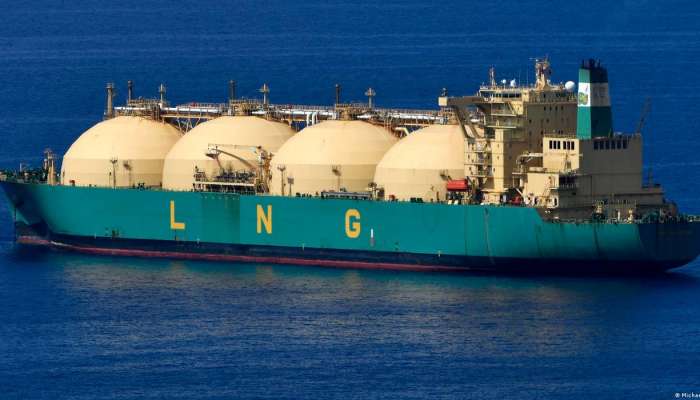
Brunsbüttel: A floating terminal in the northern German port of Brunsbüttel is to take delivery of its first load of liquified natural gas (LNG) from the United Arab Emirates on Wednesday.
Other tankers carrying fracked US gas have already landed in Germany, in a move climate activists have described as a major setback in the effort to limit global heating.
LNG is to compensate for lost Russian gas supplies, with four new terminals set to come online in Germany alone. But though touted as a short-term fix, many fear the gas is here for the long haul as the EU becomes the biggest LNG importer in the world.
With LNG creating almost 10 times more emissions than piped gas by one estimate, its rapid expansion will likely compromise climate targets, say climate researchers, who also reject claims that most LNG infrastructure is suitable for green hydrogen in the future.
And while LNG imports are key to the European Union's REPowerEU energy plan, analysts say they will not offer relief from the current Russian gas shortfall until after 2024.
But to understand the potential climate risks associated with LNG, how exactly is it liquefied, transported and distributed?
What is liquified natural gas?
LNG is natural gas reduced to a liquid state (liquefaction) through intense cooling to around -161 degrees Celsius (-259 Fahrenheit). This liquid gas is 600 times smaller than the original volume and is half the weight of water.
The compressed fossil fuel, which is constituted almost wholly of methane — a potent greenhouse gas —, can be transported around the world by ship. After arriving at its destination, the cargo is regasified in a floating terminal and redistributed through pipelines.
But despite LNG's export potential, the high cost of liquefaction and producing LNG has limited its market. In Germany, the estimated cost of building floating LNG terminals for imports to substitute Russian gas has doubled, due in part to higher operating and infrastructure costs.
The cooling, liquefying and transport processes, as well as the post-transport regasification procedures, also require a lot of energy.
"Between 10-25% of the energy of the gas is being lost during the liquefaction process," according to Andy Gheorghiu, a Germany-based campaigner and consultant on climate and energy policy.
What's the climate impact of LNG?
A lot of energy is required to extract natural gas from a reservoir, to transport from the gas field to the LNG facility for processing, to chill gas to such low temperatures, and to hold it at that temperature before it is warmed and regasified following a long sea or train journey.
Methane loss across the supply chain risks also contributes to LNG's high emissions.
"Because of LNG's much more complex production and transport process, the risks of methane leakages along the production, transport and regasification chain are simply much higher and therefore much more emissions-intensive," said Gheorghiu.
In the end, LNG emits "about twice as much greenhouse gas as ordinary natural gas," notes the US-based nonprofit Natural Resources Defence Council (NDRC).
Meanwhile, Norwegian-based energy analysts Rystad Energy told DW that processing LNG is so energy- and carbon-intensive that it can create almost 10 times more carbon emissions than piped gas.
The numerous stages required to take LNG from the wellhead to the market lead to a "very high imported emissions intensity" in comparison to piped gas, whose emissions are limited to upstream and transport and processing, according to Kaushal Ramesh, an LNG energy expert at Rystad.
The emissions intensity of piped gas from Norway in particular is almost 10 times less than average LNG emissions, he explained.
Meanwhile, LNG emits 14 times as much carbon as solar power when producing the equivalent amount of energy, and 50 times as much carbon as wind power.
Can new LNG terminals be used for green hydrogen down the track?
The floating LNG terminals now going online in Germany and already established in the Netherlands, France and Belgium are not able to be adapted into infrastructure for green hydrogen, say campaigners.
"Contrary to what is often claimed, floating LNG terminals are not convertible to hydrogen," said Olaf Bandt, chairman of Friends of the Earth Germany (BUND). "The narrative of H2 [hydrogen] readiness is simply false. They are classically fossil-fuel plants that are no good for climate protection."
Any LNG terminals that are built need to be easily retrofitted for green hydrogen to fast-track the clean energy transition, says Bandt.
The first German LNG terminal, which opened in late 2022 in Wilhelmshaven near Bremen, will be able to run until late 2043 under the LNG Acceleration Act — some eight years after all German energy is set to be renewable.
Will LNG keep gas prices lower and assure supply?
By the end of the decade, additional costs for Germany's gas imports could reach up to €200 billion ($212 billion), doubling gas bills for consumers, according to a study
by German researchers including Berlin-based climate think tank E3G.
Cheaper sustainable energy sources could instead make up the current gas deficit. Comprehensive energy efficiency upgrades in buildings and electric heat pump instalment will also "turbocharge" the energy transition, said Maria Pastukhova, senior policy adviser at E3G.
There is a corresponding fear that LNG infrastructure overcapacity and long-term regasification contracts at German LNG ports will lead to stranded assets — while simultaneously delaying the phase-out of fossil fuels.
A report by the German think tank New Climate Institute says the new planned terminals could expand capacity by two-thirds above what the nation consumes. This would not only be in conflict with Germany's national climate targets but would "constitute a breach of national legislation and international commitments under the Paris Agreement," stated the study.
Promoting energy efficiency and renewable power is the sustainable solution to the shortfall in Russian gas, insist experts.
"By investing in building efficiency alone, Germany can save more gas than new LNG terminals offer," said Andy Gheorghiu.